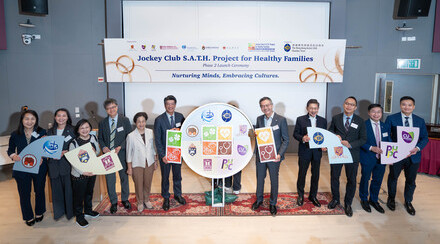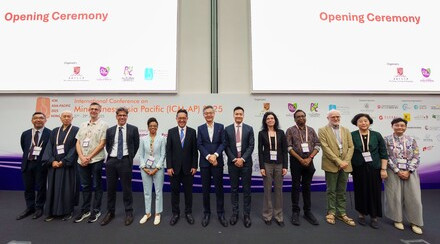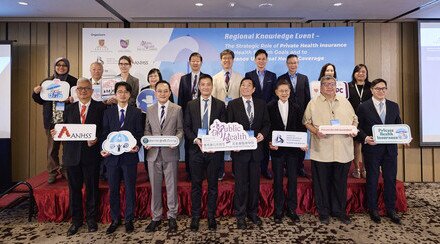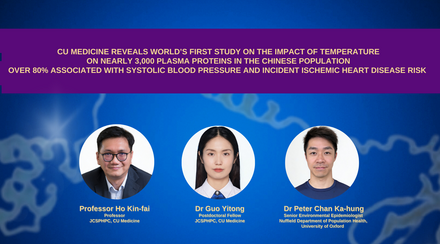CUHK-Jockey Club Pain Relief Project for the Seniors Preliminary Data Shows 90% of Interviewed Elderly Have at Least Two Pain Sites

The Jockey Club School of Public Health and Primary Care of the Faculty of Medicine at The Chinese University of Hong Kong (CUHK) has received a generous donation from The Hong Kong Jockey Club Charities Trust for the establishment of a public health programme namely “CUHK-Jockey Club Pain Relief Project for the Seniors”. (From left) Professor Samuel Yeung Shan WONG, Deputy Director, The Jockey Club School of Public Health and Primary Care, Faculty of Medicine, CUHK; Dr. Regina Wing Shan SIT, Director of the Project; Mr Sunny PAU, Charities Manager, The Hong Kong Jockey Club.
Seniors with chronic pain bear other psychological and physical problems
Professor Samuel Yeung Shan WONG, Deputy Director, The Jockey Club School of Public Health and Primary Care, Faculty of Medicine, CUHK, remarked, “Pain is personal, without symptoms. It belongs to the one feeling it. Patients with chronic pain often rely on medication to treat the pain without paying attention to the negative emotions that come with persistent pain and immobility. But in fact, their physical and psychological problems are inter-related and they need a multi-level treatment which includes dietary advice and monitoring, exercise, psychological and behavioral therapy apart from medication. Many of those over the age of 60 have been struggling with the pain for years and things get worse as they become frail. We are really grateful to receive the donation from the Trust to launch the ‘CUHK-Jockey Club Pain Relief Project for the Seniors’, with the aim of designing a series of activities promoting bone and muscle health for the elderly, raising their awareness on this health problem, increasing their ability in pain self-management, and encouraging them to live happily with the condition.”
Stepped-care model is efficient to promote pain relief training
| Body part or point which is reported the most painful | Percentage |
|---|---|
| Knee | 38% |
| Back | 21% |
| Shoulder | 15% |
Other than knee, back and shoulder, pain sites including hip, neck and feet were reported by some of the elderly. Their psychological and physical conditions were also learnt through the questionnaire. Results showed 40% of them have mild to moderate levels of anxiety and close to 80% are approaching early-frailty and frailty. On top of that, 20% may develop sarcopenia.

Dr. Regina Wing Shan SIT says many of the elderly with chronic pain also have to deal with their emotional and other physical problems.
Dr. Regina Wing Shan SIT, Associate Professor of Practice in Family Medicine, The Jockey Club School of Public Health and Primary Care, Faculty of Medicine, CUHK and Director of the CUHK-Jockey Club Pain Relief Project for the Seniors, remarked, “Our preliminary data proved that many of the elderly with chronic pain also have to deal with their emotional and other physical problems. They may withdraw themselves from exercise and social life because of the pain and unfortunately their ability to move and socialise deteriorates further. This community-based project provides public health education, workshops, case follow-up, counselling and pain relief training to promote patient care for the elderly with chronic pain. Our cross-disciplinary team consists of doctors and nurses, Chinese medicine practitioners, nutritionists, physical and occupational therapists, counselors and fitness coaches. The service is provided in a stepped-care model with a comprehensive approach, to promote pain relief training. A pain rehabilitation exercise programme, taichi and pilates are three of the many courses that attract participants’ attention. In the long run, we wish to come up with solutions which improve the bone and muscle health of seniors, from the data collected.”
| Stepped-care model | |
|---|---|
| Level 1 | Participating in public talks and health exhibitions |
| Level 2 | Enrolling in self-therapy workshops |
| Level 3 | Consultation with nurse/ physical or occupational therapists |
| Level 4 | Consultation with family doctors |

Fitness trainer from the Project provides a series of training to the participants which help strengthen their muscle and increase their body flexibility.
The Project is now recruiting 1,200 participants who are aged 60 or above, suffering from pain for at least three months. Interested individuals can register online via https://cloud.itsc.cuhk.edu.hk/mycuform/view.php?id=286625 or call 2609-5628/ 2609-5050 for more information.

Ms. Lee has been suffering from knee pain for years and in the queue for total knee replacement surgery at the public hospital. After joining the Project six months ago, her knee pain was much relieved and her walking ability has thus improved.

The team is now exploring the use of Virtual Reality (VR) games as a fun approach into pain-relief training for the elderly.




























































